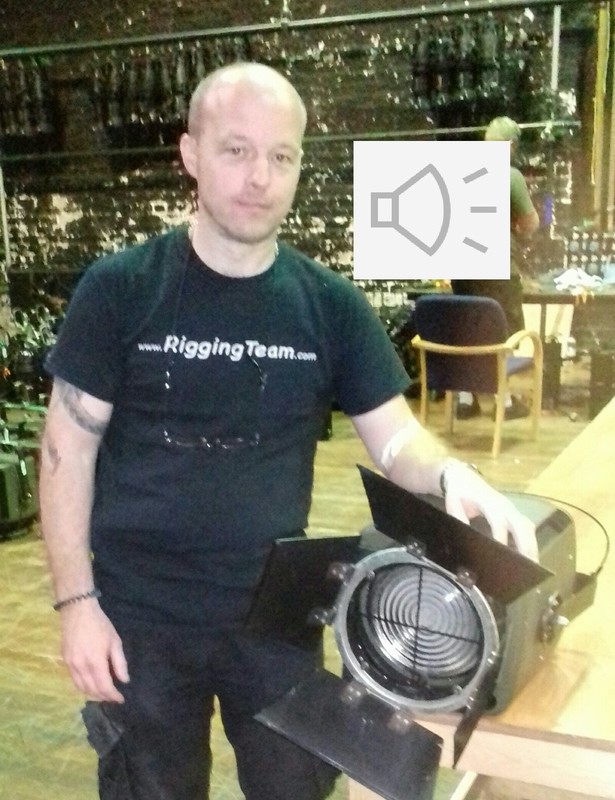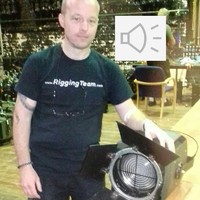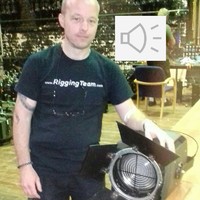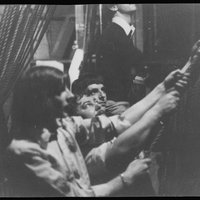Title
Michael Donoghue Interview: Learning on the Job
Date
3 August 2018
Description
Oral history interview with Michael Donoghue, Head of Sound & Lighting at the Theatre Royal
What's the story?
Born in London and involved in amateur theatre as a performer in his early years, Michael Donoghue ‘ditched’ his A levels to work professionally in the theatre. At the tender age of nineteen, in 1991 he moved to Nottingham to work as a lighting technician at the Theatre Royal.
Having clearly learnt ‘on the job’ Michael is now Head of Sound & Lighting at the venue, managing an extremely busy department.
In this interview Michael discusses how he has developed and built up his knowledge from simply learning ‘on the job’, often seen as the best way to gain skills and experience for all aspects of backstage work.
Michael also honestly talks about the hard work needed to work backstage, as well as the boredom.
I’ve got no formal qualifications for working in theatre. I did all right in my GCSEs, but that’s all I’ve got. It is a way to get into theatre. If anyone ever asked me, I’d always say try and get a good education first. But there’s a lot of people go to drama schools and drama colleges and never go into a theatre, so I guess it’s “swings and roundabouts”. A job like this has certainly always been, certainly historically speaking, is about people coming in and just learning it “on the go”, really. It’s always the best way to learn it. I guess it’s like any job. You can get qualifications that look good on paper, but when it comes down to actually doing the job, unless you’re the right person for the job. Casual staff that we get in a lot of the time, some of those have never worked in a theatre before, but we get them in.
You have to have a certain aptitude to work in a theatre, I think. It can be long hours, it can be very hard work, it can be very boring, because a lot of the time you’re just sitting around waiting for something to happen. Like during a pantomime, the first scene of a show can be three-quarters of an hour long. And you’re sat in the wings, with nothing to do. But you’re just sitting there waiting, but as soon as the scene ends, that’s it: you’ve got to jump up and you’ve got to be in it, shifting the scenery. And then again at weekends, when you’re changing a show over, depending on the size of the show, it can be either a one day fit-up or it can be up to three or four days and they’ll be, like, 12 hour days. And so they’re long days. And at the end of the week you’ve got to take the show down. So quite often people will do two shows, do the matinee and the evening performance and then you’ve got to get the show out as soon as the show finishes on a Saturday night and again, that can take anything from half an hour, if it’s a little tiny kids’ show to 8/11 hours. So it can be long. So it’s hard work sometimes and then boring work other times.
Having clearly learnt ‘on the job’ Michael is now Head of Sound & Lighting at the venue, managing an extremely busy department.
In this interview Michael discusses how he has developed and built up his knowledge from simply learning ‘on the job’, often seen as the best way to gain skills and experience for all aspects of backstage work.
Michael also honestly talks about the hard work needed to work backstage, as well as the boredom.
I’ve got no formal qualifications for working in theatre. I did all right in my GCSEs, but that’s all I’ve got. It is a way to get into theatre. If anyone ever asked me, I’d always say try and get a good education first. But there’s a lot of people go to drama schools and drama colleges and never go into a theatre, so I guess it’s “swings and roundabouts”. A job like this has certainly always been, certainly historically speaking, is about people coming in and just learning it “on the go”, really. It’s always the best way to learn it. I guess it’s like any job. You can get qualifications that look good on paper, but when it comes down to actually doing the job, unless you’re the right person for the job. Casual staff that we get in a lot of the time, some of those have never worked in a theatre before, but we get them in.
You have to have a certain aptitude to work in a theatre, I think. It can be long hours, it can be very hard work, it can be very boring, because a lot of the time you’re just sitting around waiting for something to happen. Like during a pantomime, the first scene of a show can be three-quarters of an hour long. And you’re sat in the wings, with nothing to do. But you’re just sitting there waiting, but as soon as the scene ends, that’s it: you’ve got to jump up and you’ve got to be in it, shifting the scenery. And then again at weekends, when you’re changing a show over, depending on the size of the show, it can be either a one day fit-up or it can be up to three or four days and they’ll be, like, 12 hour days. And so they’re long days. And at the end of the week you’ve got to take the show down. So quite often people will do two shows, do the matinee and the evening performance and then you’ve got to get the show out as soon as the show finishes on a Saturday night and again, that can take anything from half an hour, if it’s a little tiny kids’ show to 8/11 hours. So it can be long. So it’s hard work sometimes and then boring work other times.
Type
Oral interview
Location of item
Theatre Royal & Royal Concert Hall Nottingham
Rights
Theatre Royal & Royal Concert Hall Nottingham
Contributor
Interviewers: Jennifer Sherwood & Diane Jones
Transcriber: David Chilton
Transcriber: David Chilton



